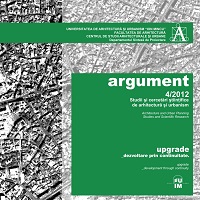BUCUREȘTIUL ÎN CĂUTAREA EUROPEI
BUCHAREST IN SEARCH OF EUROPE
Author(s): Bogdan-Andrei FeziSubject(s): Architecture, Recent History (1900 till today), 18th Century, 19th Century, History of Art
Published by: Editura Universitară “Ion Mincu”
Keywords: Bucharest; Europe; architecture; urban ism;
Summary/Abstract: Bucharest is often described as a city between East and West, as being considered in the 19th century a capital of contrasts and as being called “The Little Paris”. Those constantly repeated ideas omit one of the most successful Romanian achievements as a result of sustained effort for several generations, which is reforming the city by constantly following a Western European model. This long series of transformations are the basis for almost any street wider than 12 m, for every straight avenue, for every bank of the river Dâmbovița and for most of the parks. Motivated by the need for reform and by the consciousness of belonging to the Western Europe, at the beginning of from the nineteenth century, Bucharest started a long process of restructuring after the European model. The capital city fundamentally changed the laws, the administration, the education system. The city accomplished achievements that, in the 20th century, overtook important world metropolises. This search for the European model is due both to political and to architectural reasons. Over the centuries, the Romanian countries tried to escape the political influence of the Orient seen as oppressive. The Ottoman suzerainty, between 1716- 1821, and later then the Soviet troops which occupied the country and imposed the communist regime created a constant counter-reaction of seeking for support to the West. One of the clearest examples of this point of view came from the famous Romanian architect George Matei Cantacuzino, on the eve of World War II: “We go to war to the East, following our historical destiny line. But we fight this war to free ourselves from harmful influences. Thus, we shall look more deeply and with more serenity to the Western civilization, which is in the spirit of our past. Being Romanian means not only being born Romania, but it requires a continuous indication of a consensual attitude, appreciated sincerely and felt vigorously. We want the West with all its spiritual discipline, with all its conceptual clarity”.
Journal: Argument
- Issue Year: 2012
- Issue No: 4
- Page Range: 121-141
- Page Count: 21
- Language: English, Romanian

